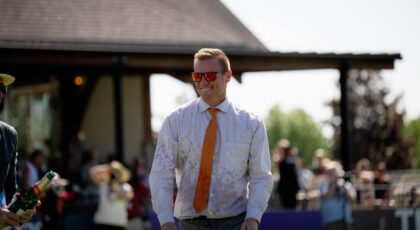Your farrier is not a god. You do not have to give him* offerings to keep him happy. You do not have to worry if your horse twitches at a fly. You shouldn’t feel uncomfortable asking why he has done something.
The customer isn’t always right, but neither is the professional.
We don’t treat other horse professionals this way. I’ve worked at a vet office and I’ve heard people routinely ask for second or third opinions, or question certain treatments, or people are unconcerned about their animals’ unruly behavior. But for some reason, this is unheard of with the Farrier God, lest you bring down his wrath and he doesn’t come trim your horse.
We allow them to show up hours after their set time, or push off a day or a week with 15 minutes notice. They aren’t cable, and if they were, at the very least we would bitch about it to no end. Instead, we are supposed to act grateful that they thought to call at all. That they rescheduled. Or that they did their job and showed up and didn’t mess up our horses’ hooves.
In my day job, I’m a journalist. I deal in facts. Unfortunately, I sometimes get those facts wrong. There’s this rule that the more times you do something, the more prone you are to making a mistake. This is true with any profession.
What’s important is admitting your mistake and rectifying it. That’s what makes you a trustworthy professional. Not digging in your heels and admitting no fault. Not declining to talk to your customer about other options or remedies.
Professionals also need to be able to work with colleagues and people from different fields. Your farrier shouldn’t balk at you talking to another farrier, talking to the vet, or consulting with the Internet or a friend. And he certainly shouldn’t get pissy when it comes to collaborating with those other people.
Stop reading articles about how your horse has to be a model for good behavior or your farrier will leave you. A good farrier won’t mind a little wiggle or a little unruliness, and a great farrier knows how to work with a horse so he gets better trim after trim.
That’s not to say your animal should be dangerous. But articles about “How to Keep Your Farrier” put undue pressure on the animal owner and elevates the farrier to a holier-than-thou position.
It’s time we start treating farriers like professionals, not vengeful gods. Hold them accountable, don’t be afraid to speak your mind (even if you feel like you don’t have the education to say something).
Your farrier is not a god. Stop treating him like it. Ask, question, consult, demand. Don’t be afraid. He will not curse your horse’s hooves—and if he does? Well, there are plenty of other hoof care professionals.
*Yes, I’ve used a male pronoun here, but not to the exclusion of women or people who don’t adhere to a gender. Hoof care is a field primarily composed of men, so that’s the pronoun I’ve used. If I offend anyone, I am truly sorry. I’ve also gone with the term “farrier” instead of “hoof care professional.” Make no mistake, this refers to trimmers as well.
About the Author
An award-winning, 17-year veteran of the newspaper world, L.C. Street lives at the barn and the newsroom in Charleston, S.C., where she side-hustles as a hoof care consultant. The Wilding, her debut novel, was released in April 2015.




 August 1, 2017
August 1, 2017 



























